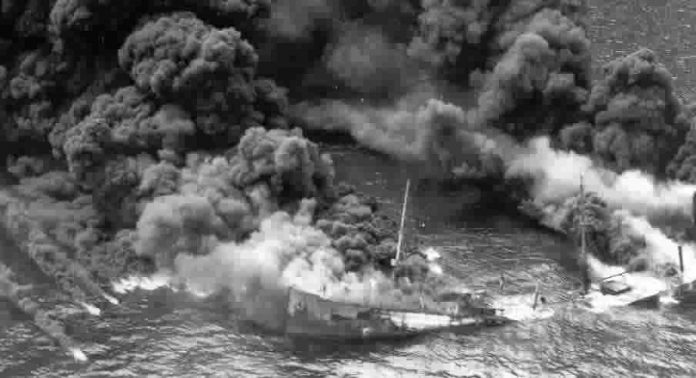
History 02/03/20 PQ-17: why did the Soviet Union accused the allies in the destruction of this convoy
In July 1942 in the Arctic waters was one of the most tragic episodes in the history of supplies to the Soviet allies during the Second world war – the death of convoy PQ-17 which was supposed to deliver to the Soviet Union a large military cargo under lend-lease. Was his death inevitable? Or it could have been prevented if not for an error command? Today this event is dedicated to the many historical works which leave no doubt that the cause of the tragedy was the wrong calculation of the first Lord of the British Admiralty.
hard way
the Northern route was the shortest route of delivery of aid under lend-lease, which the Soviet Union joined in late 1941, But at the same time, he was the most dangerous, as it ran along the coast of Nazi-occupied Norway. In addition, the problems created by the fact that the White sea was frozen in winter, and the port of Murmansk was near the front line. However, in the first year of the war the allies had no choice but to deliver the military supplies that way. Until the end of 1941 this path has successfully passed the 11 convoys, which was marked with the initials of the officer in the British Admiralty Quilin Peter (Peter Quelyn) responsible for sending them.
the Fatal order
Convoy PQ-17 consisting of 35 cargo ships, accompanied by a naval escort under the command of John Broome, as well as a group in the middle of the cover, which was led by rear Admiral Hamilton. PQ-17 was carrying in the USSR, important cargo that the Germans wanted at all costs to destroy, because, according to Valentin Pikul, the author of the book “Requiem caravan PQ-17,” his loss “was reflected in the Affairs of the Eastern front, the works of Paulus, who joined the battle for Stalingrad”.
the Convoy came out from Reykjavik on 27 June 1942, And on 4 July, the British intelligence discovered that the German battleship “Tirpitz”, which after the defeat atworn Royal Navy uniform battleship Bismarck, the most feared by the British, came from the Parking lot in a Norwegian port. Believing that he intended to attack the convoy, first Lord of the British Admiralty Dudley pound gave the order: “Command of the escort commander of the Navy of the metropolis – from the Admiralty. Owing to threat from surface ships need to spread out…”.
However, this decision was made based on false data. In fact, the “Tirpitz” at that moment, was not sent to intercept the convoy, and was relocated in Alten fjord.
on 5 July, after it was removed cover convoy PQ-17, the cargo ships were attacked by German aircraft and submarines. As a result, 23 of the ship was destroyed, killing 153 seamen died.
Silent media
noteworthy is the fact that the loss of the convoy for a long time was extensive media coverage of the anti-Hitler coalition, and if the information appears, without specifying the extent of the tragedy. Germany, by contrast, was soon issued statements about their triumph, allowing about the defeat of the convoy became known neutral countries. According to the German radio, which in early 1942, was first cited by the American magazine “Life”, “aircraft sank 122000 tons, 70000 tons sunk submarines”. At the same time, American media pointed out that on 9 July the Soviet Union announced that the convoy “arrived safely in the Russian Arctic port” (it was about surviving ships).
In the UK reaction to the death of PQ-17 followed only in the spring of 1943, when the naval officer Lord winter raised this issue in the house of lords. Then in the “Daily Express” published an article which partly became known details of the tragedy of July 1942, the British newspaper, in particular, reported that it was rescued only 4 of the vessel. However, neither the media nor the British authorities did not tell about the possible error command during the operation to support the convoy.
Unmasking
the First allegations of ADRsEU allies came to the USSR after the war. In 1948 the newspaper “Red fleet” published two articles by captain V. Andreeva, who said: “the Main reason for the dispersion of the convoy, it seems, was the confusion in the minds of the British command, an exaggerated fear of the German ships, the fear of “loss” in the battleships that “can” take place”. He also pointed out that the order for dispersion was given at the moment when the enemy ships were still at a considerable distance (“300 miles”).
Only in 1957 the British recognized the error Dudley pound, who did not live to that time, died in 1943 from a heart attack. Wrote about this in his book “War at sea” the official historian of the British Admiralty Stephen W. Roskill.
In 1963 he released another book-exposing “the destruction of convoy PQ-17,” written by historian David Irving, who said another version of the causes of the incident. He believed that this tragedy was the result of deliberate attempts of the Admiralty to disrupt the delivery of supplies to the USSR. In 1970 John Broome sued Irving for libel and won the case, receiving compensation in the amount of 40 thousand pounds sterling.
Maria tonkova
Source:
© Russian Seven
Recommended statesalaska… Share: Comments Comments on the article “PQ-17: why did the Soviet Union blamed the allies for the deaths of the convoy” Please log in to leave a comment! br>
Share on Tumblr
















